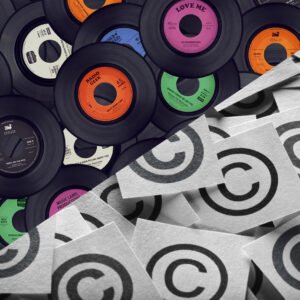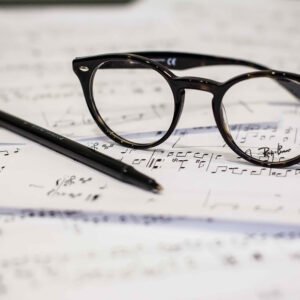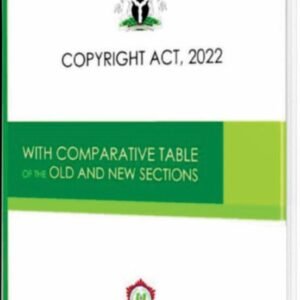This article will delve into the world of Copyright and Music Licensing in Nigeria, shedding light on the regulations, rights, and practices that every musician should be aware of.
Music is a powerful form of artistic expression, and for musicians in Nigeria, understanding the intricacies of music licensing and copyright is essential for protecting their creative works and ensuring fair compensation.
Copyright and Music Licensing in Nigeria: Understanding Your Rights as a Musician
The Music Licensing and copyright system is designed to reward those who have devoted their time and resources to producing original content—it seeks to balance the individual and communal interests by granting an individual copyright owner proprietary rights and by protecting their work from unlicensed exploitation or use for a particular period of time after which the proprietary right expires and the work becomes available in the public domain for public use.
What is a Music Copyright?
Whenever a musician creates a piece of music, there are two music copyrights created. The first copyright is the authorship or musical composition of the song, consisting of the melody and lyrics.
The second is what is commonly referred to as the “master recording” or, more simply, the recorded music track. The owner of the copyright, or the musician, has exclusive rights to their work.
Understanding your copyright protection is vital to making sure that no one uses your music unlawfully. As long as you are the sole owner and creator, you are the only one who can give rights to allow authorized parties to reproduce, distribute, or publicly perform or display that music.
Copyright Basics for Musicians
Copyright is the bedrock of protection for musicians. It grants exclusive rights to the creators of original musical works, ensuring they have control over their compositions and recordings.
Here are the fundamental aspects of copyright that every musician should know:
- Ownership: As a musician, you are the initial owner of the copyright to your musical compositions. If you collaborate with others, it's crucial to establish clear ownership through contracts or agreements.
- Fixation: Your music must be fixed in a tangible medium of expression, which can include sheet music, audio recordings, or written lyrics. Fixation provides the material form necessary for copyright protection.
- Exclusive Rights: Copyright bestows upon you a set of exclusive rights, including the authority to reproduce, distribute, perform, and adapt your music. These rights are your creative domain, and no one else can exercise them without your permission.
- Duration: Copyright protection has a finite lifespan. In many countries, including the United States, it typically lasts for the lifetime of the creator plus an additional 70 years. After this period, your music enters the public domain, allowing unrestricted use.
- Fair Use: Fair use is a concept that permits limited use of copyrighted material without permission for purposes like education, commentary, criticism, and news reporting. Understanding fair use is essential for navigating situations where your music may be used without infringing your copyright.
The Foundations of Music Copyright in Nigeria
In Nigeria, copyright protection is conferred automatically upon the creation of an original musical work. This means that as soon as a musician or songwriter creates a piece of music, whether it's a catchy melody, a set of lyrics, or a full-fledged composition, it is inherently protected by copyright.
This automatic protection applies to a wide range of musical works, from traditional folk songs to contemporary pop hits. This fundamental principle is vital for musicians because it means that they don't have to navigate a complex registration process to secure copyright protection.
As soon as the musical notes are composed, the lyrics penned, or the melody hummed, the creator holds the copyright to that particular work. This inherent protection provides an essential foundation for musicians, granting them ownership and control over their creative efforts.
Understanding Copyright Duration
As obtainable in most countries, the NCA stipulates the duration within which copyright in works subsists before the work goes into the public domain, at which point it may be exploited by anyone without consequences.
What this means is, unlike such other intellectual property rights as a trademark—which when maintained can last indefinitely—copyright is not a perpetual right.
According to Paragraph 1 of the NCA’s First Schedule, copyright in literary, musical, or artistic works other than photographs remains in force for 70 years after the year of the author’s death. (If the copyright is owned by an organization or a corporate entity, it lasts 70 years after the end of the year the work was first published.)
Copyright in cinematography films and photographs lasts for 50 years after the end of the year in which the work was first published; copyright in sound recordings lasts 50 years after the end of the year in which the recording was first made, and copyright in broadcasts lasts 50 years after the end of the year in which the broadcasting first took place.
For anonymous literary, artistic, or musical works, copyright subsists for 70 years after the end of the year the work was first published.
The Role of the Nigerian Copyright Commission (NCC)
The Nigerian Copyright Commission is the governmental authority responsible for enforcing copyright laws in the country. While copyright protection is automatic upon the creation of a musical work, registering your copyright with the NCC is a prudent step.
Registration provides additional legal protection, making it easier to prove ownership in case of disputes. It also opens the door to statutory damages and attorney's fees in the event of copyright infringement.
One of the primary roles of the NCC is to enforce copyright laws in Nigeria. This entails taking action against copyright infringement, which includes the unauthorized use, reproduction, or distribution of copyrighted musical works.
When musicians or copyright holders identify instances of copyright infringement, they can report these cases to the NCC for appropriate legal action. The NCC actively contributes to the development of copyright-related policies and legislation in Nigeria.
The agency works to align national copyright laws with international standards, ensuring that Nigerian musicians have the necessary legal framework to protect their works.
Exclusive Rights of Copyright Holders
As a copyright holder in Nigeria, you enjoy several exclusive rights, including:
- Reproduction: The right to create copies of your music, whether in sheet music form or sound recordings.
- Distribution: The ability to control how your music is distributed, whether through physical copies, streaming platforms, or digital downloads.
- Public Performance: The power to determine when and where your music is performed publicly, whether at concerts, on the radio, or on television.
- Adaptation: The authority to decide if your music is used in derivative works, such as remixes or adaptations.
These exclusive rights are pivotal, as they allow you to profit from your creative efforts and have control over how your music is utilized.
Music Licensing in Nigeria
Music Licensing is simply the transfer of exclusive or non-exclusive rights, authorization, or permission to another person, permitting them to reproduce, publish, perform, make translations or adaptations, broadcast, or distribute a musical composition or sound recording for commercial purposes, usually for a period of time. In practical terms, music licensing can be likened to renting one’s song or sound recording to third parties.
In copyright law, the copyright owner of a song or sound recording is solely granted these rights to commercially exploit the song or sound recording to the exclusion of others.
However, the copyright owner (the licensor) may decide to license the exploitation of one or more of these rights to another person (the licensee) in return for royalties, a lump-sum payment, or some form of compensation (either monetary or non-monetary). The commercial exploitation of a song or sound recording without license or authorization from the copyright owner amounts to copyright infringement.
A licensing agreement is usually required to facilitate the transfer of rights over musical works. Where a music license is granted, ownership rights remain vested in the copyright owner (licensor), while the other party (licensee) now has the legal authority to exercise some or all of the artist’s rights to such extent as is allowed in the license agreement between the parties.
Licensing is essential for musicians who wish to see their music featured in films, advertisements, TV shows, video games, and more.
Types of Music Licenses
- Mechanical Licenses: These licenses cover the reproduction and distribution of your music in recorded form, such as CDs or digital downloads.
- Performance Licenses: For public performances, including concerts, radio broadcasts, and live shows, performance licenses are required.
- Synchronization Licenses: If your music is to be synchronized with visual media, such as in films, advertisements, or television shows, synchronization licenses are necessary.
- Print Music Licenses: For composers and songwriters, print music licenses pertain to the publication and distribution of sheet music.
Collecting Music Royalties
In Nigeria, collecting music royalties is facilitated through collective management organizations (CMOs). These organizations help musicians receive their fair share of royalties for the use of their music in various mediums. Registering your music with a CMO is a crucial step in ensuring you receive the compensation you're entitled to.
Music Licensing under the Nigerian Copyright Act
Artists possess a legitimate entitlement to receive compensation whenever their musical compositions or sound recordings find utilization in public and commercial settings, such as hotels, clubs, and television stations.
Regrettably, there exists a pervasive lack of awareness among artists regarding the effective exploitation of their copyrights to generate a sustainable revenue stream. In particular, a music copyright license serves as a legal authorization to employ music in circumstances where such usage would otherwise constitute copyright infringement.
Upon the issuance of a music license, the ownership rights remain firmly vested in the artist, the licensor, while the party receiving the license, the licensee, obtains the legal authority to exercise some or all of the artist's rights, as delineated within the terms of the license agreement.
Within a licensing agreement, it is incumbent upon the licensee to provide commercial or financial compensation. This compensation may take the form of royalties or lump sum payments. Lump sum payments are typically made upon the issuance of the license and represent the value of the rights being acquired.
Diverse forms of music royalties exist. Mechanical royalties emanate from the digital and physical reproduction and distribution of copyrighted works, synchronization royalties derive from the association of copyrighted music with visual media, and public performance royalties result from the public performance, recording, or presentation of copyrighted works.
While there is optimism surrounding the continued growth of the Nigerian music industry, artists must also be attuned to the legal and economic aspects of their profession. For artists, it is no longer sufficient to merely possess talent; it is equally vital to possess legal and commercial acumen.
Key Players in Music Licensing
Music licensing involves a network of individuals and organizations working together to ensure that artists' creative works are utilized legally and fairly while enabling the proper compensation of rights holders.
This complex interplay of parties comprises a harmonious ensemble, each with its unique role in the music licensing process.
1. Copyright Holders (Artists and Songwriters): These are the creators of the musical works, including the composers, lyricists, and performers. They hold the original copyrights to their music. Copyright holders have the right to grant licenses for the use of their music.
2. Music Publishers: Music publishers represent songwriters and composers. They handle the administrative aspects of music licensing, including negotiating licenses, collecting royalties, and ensuring that the creators receive their fair share of compensation.
3. Record Labels: Record labels primarily represent the recording artists and are responsible for the master recordings. They play a role in licensing music for various uses, especially when it involves sound recordings.
4. Collective Management Organizations (CMOs): CMOs are responsible for collecting and distributing public performance royalties to songwriters and publishers. In Nigeria, a prominent CMO is the Musical Copyright Society of Nigeria.
5. Licensing Agencies: These entities act as intermediaries between the copyright holders and the licensees, making the licensing process more efficient. They can assist in negotiating and managing licenses on behalf of artists and creators.
6. Licensees: Licensees are the end-users of the music and may include various businesses, such as:
- Television and Radio Stations: They license music for use in broadcasts, including theme songs, background music, and advertisements.
- Film and Television Production Companies: These entities require licenses for music to be used in films, TV shows, documentaries, and commercials.
- Digital Streaming Services: Platforms like Spotify, Apple Music, and YouTube obtain licenses to stream music to their subscribers.
- Bars, Restaurants, and Clubs: These venues need licenses to play music for their patrons, whether through live performances, recorded music, or streaming.
- Retail Stores: Shops often play background music, and they must secure licenses for the use of copyrighted music.
7. Regulators and Copyright Agencies: In Nigeria, the Nigerian Copyright Commission (NCC) oversees copyright-related matters and enforces copyright laws. They also provide guidance on licensing procedures and regulations.
Need Assistance with Music Copyright Registration? We Can Help.
While it's possible to copyright music on your own, it can be a complicated process when it's challenging to understand copyright laws. Let 1710Media help you sort through the red tape and handle all your music copyright needs.
Register and protect music from theft and plagiarism
1710Media provides the fastest and most affordable way for you to protect your copyrights. Our Music Copyright Service includes the preparation, review, e-filing with the Nigerian Copyright Commission (NCC), and handling of correspondence until you receive your certificates of registration.
- We'll file your application with the Nigerian Copyright Commission (NCC).
- Our service includes the preparation, review, e-filing, and delivery of your certificate of registration.
- Receive an Official Copyright Certificate. Valid for your lifetime plus a minimum of 50 years after.
- Register your songs, albums, compositions, beats, lyrics, music videos, artworks, and other musical projects.
- Enjoy protection in Nigeria and 178+ other territories.
Get Started Now!





